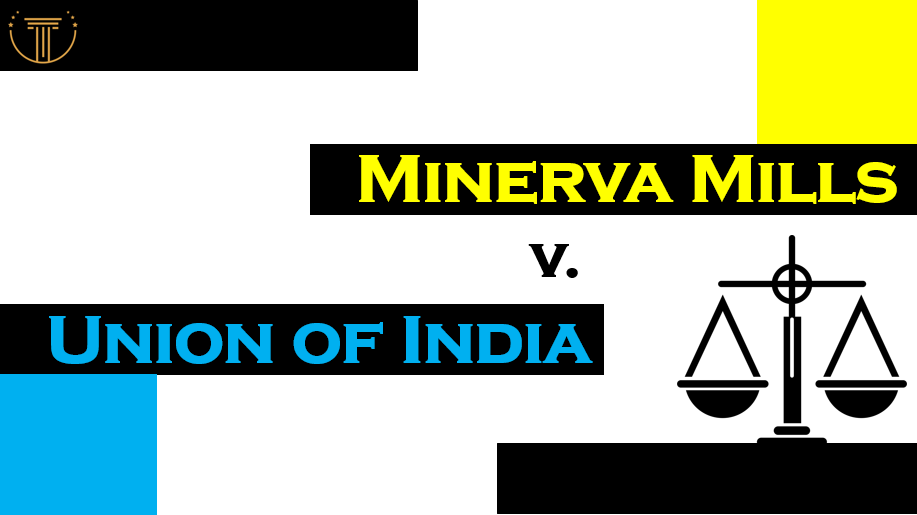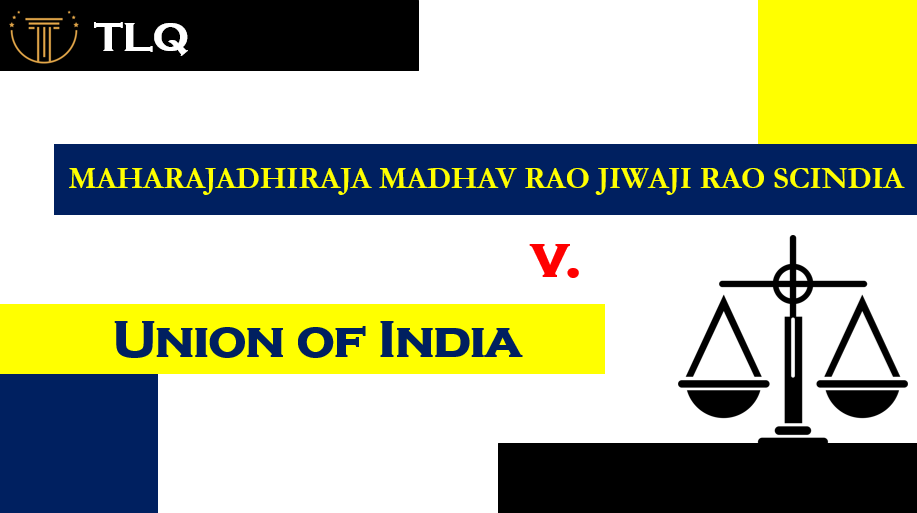Published On: 26th November, 2024
Authored by: Ritu Raj
S.S Khanna Girls Degree College
|
CITATION |
AIR 2018 SC 4321, (2018) 10 SCC 1 |
|
DATE OF JUDGMENT |
6th September 2018 |
|
COURT |
Supreme Court of India |
|
APPELLANT |
Navtej Singh Johar, Ritu Dalmia, Ayesha Kapur, Aman Nath, Sunil Mehra |
|
RESPONDENT |
Union of India |
|
BENCH
|
Chief Justice Dipak Mishra, Justice Rohington Nariman, Justice D.Y Chandrachud, Justice A M Khanvilkar, Justice Indu Malhotra |
INTRODUCTION
Britishers have ruled India for over 250 years. They exploited Indians through their Acts as well as codified laws through Acts. In the 19th Century, the Indian Penal Code was framed by British Colonial Rulers. As it was made by Britishers, the law was based on existing laws of British. The Indian Penal Code had 511 Section. Section 377 of the Indian Penal Code was framed on the basis of The Buggery Act, 1533 which was the law of the 16th century. This legislation categorises all homosexual acts, and sexual activities involving sydomy as well as animals. This kind of Act is defined as against the will of the god and considered as unnatural offences. Therefore, these kinds of acts were punishable by death. The result of this Act was the uncountable cases of suicide.
On 10 June 2018, two ladies Asha Thakor and Bhavna Thakor who were indulging in homosexual activities with each other faced several social issues as well as the law did not provide support to them committed suicide by leaving a note, saying “We will live together in another world”. Not only girls were facing these issues, but also boys who are considered to be strong in comparison to girls committed suicide due to the illegal status of homosexual activities.
There were several previous cases that raised the question of the unconstitutionality of Section 377. The first ever case was NGO- AIDS Bhedbhav Virodhi Abhiyan in 1994 in which the petition was filed by NGO in Delhi High Court against the aforesaid section but the petition was dismissed by the court in 2001.
Another case was NAZ Foundation v. Government of NCT and Ors (2009), in which the petition was filed for decriminalising homosexual acts as it was violative of the fundamental rights of the LGBTQ section of society. Here, the judgement was in favour of the LGBTQ community. But, the satisfaction from the judgement does not last long.
The case of Suresh Kumar Koushal and Ors. v. NAZ Foundation and Ors (2013), it was an appeal filed against the above judgement. The contention of the appellant was that section 377 does not violate Article 15 and section 377 was not the reason behind the vulnerability of the LGBTQ community. They mentioned that the term sex does not include the term sexual orientation, hence not violative to the Constitution. The court overruled the above case judgement and again declared Section 377 as constitutional.
The landmark case regarding this was NAVTEJ SINGH JOHAR AND ORS. v. UNION OF INDIA AND ORS (2018).
FACTS OF THE CASE
The Central issue of the case was to repeal Section 377 of the Indian Penal Code,1860 as it was unconstitutional. The Section was denying many people to get their basic human rights. This Section was titled “unnatural offence” which states that anyone voluntarily has carnal intercourse against the natural order with man, woman, or animal shall be punished with imprisonment for life and may imprisonment extend to 10 years with a fine. This section denies the persons having an interest in same-sex persons.
ISSUES RAISED
The main issue is to check the constitutional validity of Section 377 of the Indian Penal Code,1860.
- Whether the Section 377 violate Article 14 of the Indian Constitution?
- Whether the Section 377 violate Article 15 by discriminating against individuals on the basis of Sexual orientation?
- Whether Article 19(1)(a) violated due to Section 377 of the Indian Penal Code?
- Whether Section 377 is violative of Article 21 as it violates the Right to Privacy and dignity of the individual?
- Whether the Section 377 provided in the Indian Penal Code is of arbitrary nature?
- Whether there is need for Reform in the Indian Penal Code?
- Whether the reason for the vulnerability of the LGBT community is section 377?
CONTENTIONS OF PETITIONER
- The Petitioner stated that Homosexuality which is considered as an unnatural offence under section 377 is a natural action and is not against the will of God. It is not any kind of illness. It is their personal choice and its criminalization leads to violation of Article 21 as it affects the dignity of the individual.
- The Petitioner said that the community of LGBTQ comprises 7-8% of the country’s population and the rest of the population considering them as alien is not good. Therefore there is urgency for the recognition of this community.
- The Petitioner also stated that the retaining of Section 377 will lead to the violation of various Fundamental Rights like the Right to Privacy, and Freedom of Expression.
- The Petitioner mentioned that inter-caste marriage and inter-religion marriage are the same as people who choose the same kind of sex for sexual activities.
- The Petitioner argued that Section 377 is from the Victorian era where the relationship was only for reproductive processes.
- The petitioner said that there is no reasonable classification between natural and unnatural acts.
- The Petitioner argued that the criminalisation of homosexuality is violative of Article 15 as it discriminates between individuals.
- The Petitioner argued that Section 377 is violative of Article 14 and also of Article 19.
CONTENTIONS OF REPONDENT
- The Respondent argued that decriminalization of homosexual acts will lead to the deterioration family system and many young people will use it as a trade practice.
- The Respondent stated that it will disturb the religious belief of the country which will be violative of Article 25 which needs concern as well as Fundamental Rights are not absolute.
- The Respondent contended that the countries that have decriminalised consensual homosexuality have different political, economic and cultural heritage in comparison to India.
- The Respondent suggested that controversial words mentioned in Article 377 can be clarified which will be enough as they will target only those people who do non-consensual acts.
- The Respondent contended that Section 377 is not violating Article 15 as the term ‘sex’ does not include ‘sexual orientation’
- The Respondent stated that Section 377 is for the benefit of citizens to protect them from the harmful consequences of carnal intercourse.
- The Respondent also stated that Article 377 is not violative of Article 14 as the section mentions only a particular offence with punishment.
JUDGEMENT
- The Court stated that the LGBTQIA+ Section is however minor in society but the status of a minority of any community does not deny them from having the Right to Privacy which includes sexual orientation and individual autonomy. The court stated that it is violative of Article 21 as the dignity of the individual is affected.
- The Court stated that Section 377 is violative of the Right to choice as every individual has the right to choice so they must have that.
- The Court stated that the retaining of Section 377 was to protect women and children from non-consensual intercourse but the LGBT community perform consensual intercourse which is not harmful for women or children.
- The court declared that section 377 is violative of Article 14 and as our constitution is liberal we cannot make the Right to choice as absolute.
- The Supreme Court declared that the Section is violative of Articles 14,15,19(1)(a) and 21.
- The Supreme Court declared Section 377 of the Indian Penal Code as arbitrary and unconstitutional.
LEGAL REASONING
The legal reasoning behind the judgement of the landmark case was that 7-8% population of the country was unrecognised by the constitution. They were denying of the basic human rights. They were suffering from the harassment by patriarchal society. People committed suicide which was a major problem and an embarrassment for our country.
As our constitution guarantees to provide all fundamental rights to citizens and by giving the judgement in favour of the victim community, our judiciary fulfilled the promise mentioned in the constitution.
The Five-judge Bench headed by The Chief Justice of India ‘Deepak Mishra’ overruled the decision of Case Suresh Kumar Koushal v. NAZ Foundation and Ors, popularly known as the Koushal Case. The Constitutional Bench checks the validity of Section 377 by interlinking it with fundamental rights mentioned in The Constitution of India.
The legal reasoning behind the unconstitutionality of Section 377 was that unreasonable restrictions on acts within a person’s private space. The basic feature of our constitution is Fundamental Rights and no one can violate that, and the judgement upheld this. Therefore, the Supreme Court declared Section 377 unconstitutional as it was violative to Article 14, Article 15, Article 19(1)(a), and Article 21 as all of these Articles were fundamental rights.
CONCLUSION
The court upheld the right to equal citizenship for all the members of the LGBTQ community in India. The judgement from this landmark case led to exclude the consensual intercourse between adults but non-consensual intercourse is punishable.
The significance of this judgement was the recognition of the LGBTQ community. It decriminalizes consensual homosexuality not only for the LGBTQ community but also for all the citizens of India. The judgement is a landmark as it restores the rights of various people who almost gave up their guts. The judgement was again to prove that The Constitution Of India protects the victims too and the articles mentioned there are not only in theory but also practically applicable to everyone. The judgement holds immense persuasive value for other nations which continue to criminalize homosexuality.
Despite this landmark judgement, people who are choosing partners of the same sex are still facing issues in society. The LGBTQ community still facing harassment by society as society is still not ready to accept them as normal personalities. Our society is still living in ancient days as they left their child when they found the nature of homosexuality. Many people still consider them mentally ill. The number of suicides after this judgement from the LGBT community does not decrease, contrarily it increases day by day because people of the community are still facing discrimination, rest of the people still ridicule them.
It is evident that our society must come out of its old mindset and accept LGBT people as normal people as well as respect their rights and not harass them.
REFERENCES


